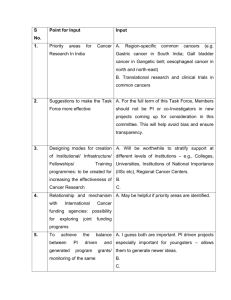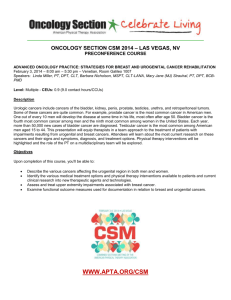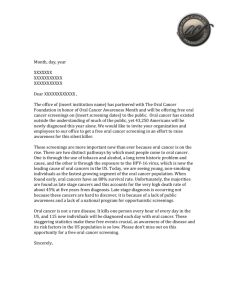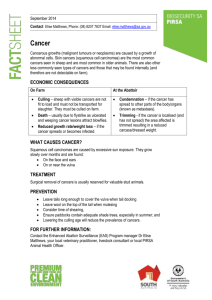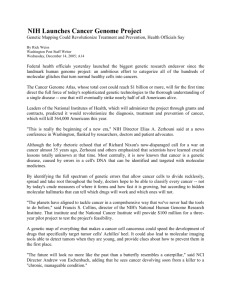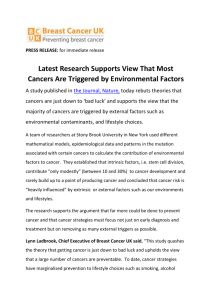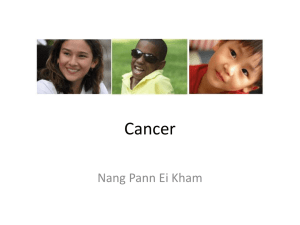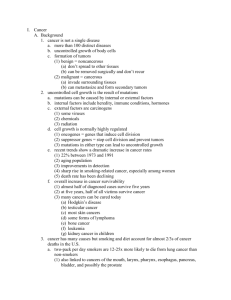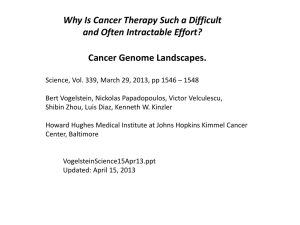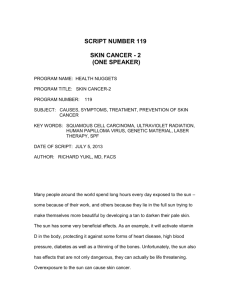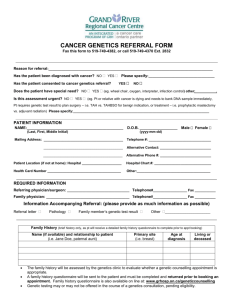New Life New Hope Breast Cancer Survivors Group March 4, 2014
advertisement
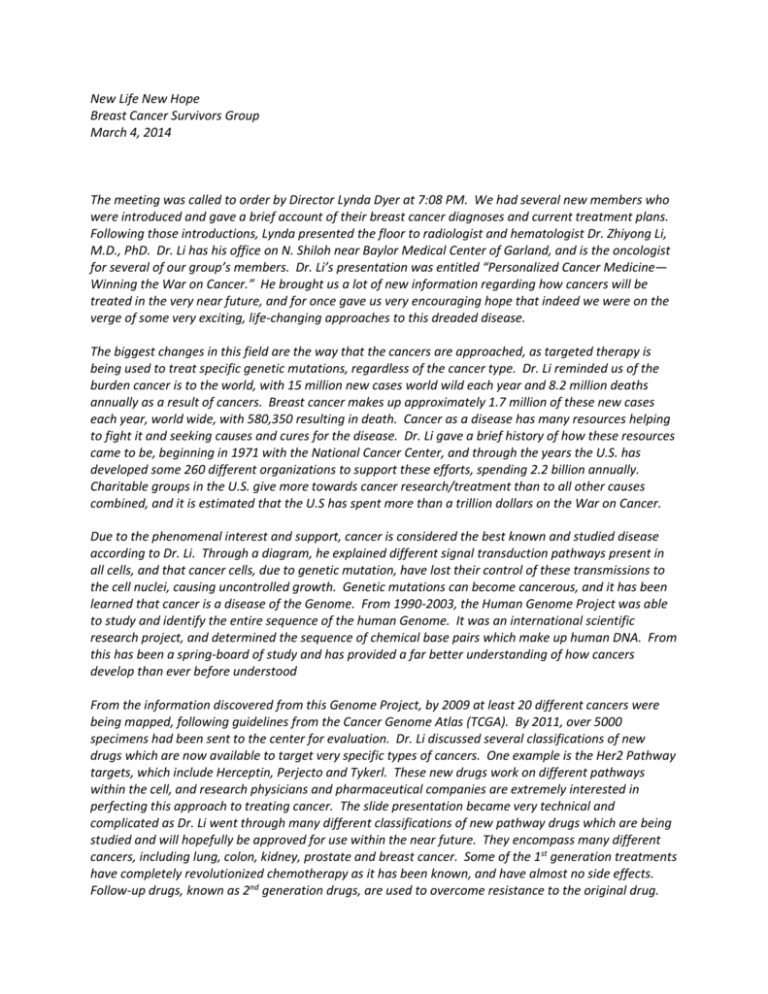
New Life New Hope Breast Cancer Survivors Group March 4, 2014 The meeting was called to order by Director Lynda Dyer at 7:08 PM. We had several new members who were introduced and gave a brief account of their breast cancer diagnoses and current treatment plans. Following those introductions, Lynda presented the floor to radiologist and hematologist Dr. Zhiyong Li, M.D., PhD. Dr. Li has his office on N. Shiloh near Baylor Medical Center of Garland, and is the oncologist for several of our group’s members. Dr. Li’s presentation was entitled “Personalized Cancer Medicine— Winning the War on Cancer.” He brought us a lot of new information regarding how cancers will be treated in the very near future, and for once gave us very encouraging hope that indeed we were on the verge of some very exciting, life-changing approaches to this dreaded disease. The biggest changes in this field are the way that the cancers are approached, as targeted therapy is being used to treat specific genetic mutations, regardless of the cancer type. Dr. Li reminded us of the burden cancer is to the world, with 15 million new cases world wild each year and 8.2 million deaths annually as a result of cancers. Breast cancer makes up approximately 1.7 million of these new cases each year, world wide, with 580,350 resulting in death. Cancer as a disease has many resources helping to fight it and seeking causes and cures for the disease. Dr. Li gave a brief history of how these resources came to be, beginning in 1971 with the National Cancer Center, and through the years the U.S. has developed some 260 different organizations to support these efforts, spending 2.2 billion annually. Charitable groups in the U.S. give more towards cancer research/treatment than to all other causes combined, and it is estimated that the U.S has spent more than a trillion dollars on the War on Cancer. Due to the phenomenal interest and support, cancer is considered the best known and studied disease according to Dr. Li. Through a diagram, he explained different signal transduction pathways present in all cells, and that cancer cells, due to genetic mutation, have lost their control of these transmissions to the cell nuclei, causing uncontrolled growth. Genetic mutations can become cancerous, and it has been learned that cancer is a disease of the Genome. From 1990-2003, the Human Genome Project was able to study and identify the entire sequence of the human Genome. It was an international scientific research project, and determined the sequence of chemical base pairs which make up human DNA. From this has been a spring-board of study and has provided a far better understanding of how cancers develop than ever before understood From the information discovered from this Genome Project, by 2009 at least 20 different cancers were being mapped, following guidelines from the Cancer Genome Atlas (TCGA). By 2011, over 5000 specimens had been sent to the center for evaluation. Dr. Li discussed several classifications of new drugs which are now available to target very specific types of cancers. One example is the Her2 Pathway targets, which include Herceptin, Perjecto and Tykerl. These new drugs work on different pathways within the cell, and research physicians and pharmaceutical companies are extremely interested in perfecting this approach to treating cancer. The slide presentation became very technical and complicated as Dr. Li went through many different classifications of new pathway drugs which are being studied and will hopefully be approved for use within the near future. They encompass many different cancers, including lung, colon, kidney, prostate and breast cancer. Some of the 1st generation treatments have completely revolutionized chemotherapy as it has been known, and have almost no side effects. Follow-up drugs, known as 2nd generation drugs, are used to overcome resistance to the original drug. Some have been so successful that they are on the fast track for approval and will be available soon, according to Dr. Li. Foundation Medicine, Inc., located in Boston, is studying mutations and analyses specimens and their response to target medications. Another huge area of study, with great success, is cancer immunotherapy, similar to a vaccine, whereby the T cell (main immune assistant) is allowed molecular freedom to destroy cancer cells. Some of these drugs have already been successfully used to treat lung, kidney and melanoma cancers. Dr. Li gave an example of a real success story which was very encouraging and exciting. He reminded us that chronic myeloid leukemia (CML), a most fatal cancer of the blood, prior to 1999 was treated with bone marrow transplant and often had poor outcome. Now it is highly curable using effective target drugs for BCR/ABL gene rearrangement. Gleevec is the 1st generation drug used, with several 2nd generation drugs available if needed. This has revolutionized how cancers are evaluated and treated. I don’t want the complexities of Dr. Li’s slide presentation to get in the way of his over-all message, which was one of hope, of enthusiasm and enormous encouragement for the future. With the continual studies by the National Cancer Institute and the National Genome Project, combined with the worldwide support of these studies, the interest and the financial backing seeking a cure for cancer, Dr. Li said we are on the very cusp of positive breakthroughs whereby we will soon look at cancer and its treatment completely differently than we have in the past. With individual, targeted approaches to treatment, he feels surgical intervention may soon not be a part of the treatment, and that cancers will be cured by treatment of the genetic mutation with specific, targeted therapies. How fantastic would that be??!! Following his presentation, Dr. Li graciously answered our questions. At the conclusion, he poignantly reminded us that the United States is at the forefront of these studies, that medical care and research in this country is far better than other parts of the world, and that we must use new therapies as they are developed and not rely on non-scientific, invalidated approaches when treating cancer. The evening ended on such an upward note, with all of us feeling encouraged and invigorated, and the sense that perhaps we will live to see a cure to this illusive disease in our lifetime, after all. We are so fortunate to have dedicated physicians like Dr. Li , willing to bring their updated message of hope to us and to share their invaluable knowledge with us so that we can continue to learn and share that knowledge with others. Our meeting came to a close around 9:00 PM. Respectfully submitted, Nancy Zucker, Board Member
